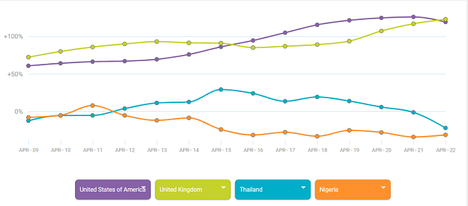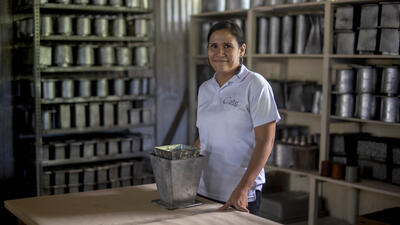
Blog: The e-commerce response to COVID-19
How can e-commerce bring economic opportunity to small businesses?
Tanglee Seepanthong sells meat, chicken and fish in Khuadin Market, Vientiane in the Lao People's Democratic Republic. After the first confirmed cases of COVID-19 in March her sales collapsed, as shoppers stayed away from the market. She turned to Facebook, offering online orders and free home delivery to residents of the city. Within days she had transformed her business, generating over five times her typical sales at the market.
It is not evident that e-commerce offers such easily accessible and lucrative opportunities everywhere. In some markets, including India and South Africa, all transportation of goods deemed non-essential has been banned, effectively suspending e-commerce for small businesses. In Europe, Amazon stopped the receipt of most inbound goods in mid-March, with the exception of a list of priority items. By limiting access to its outsourced logistics service 'Fulfilled by Amazon", Amazon effectively put a stop to the trade of many small businesses not in the 'essential goods' category.
Worldwide, the online channels benefitting from a demand boom in March (when most countries entered lockdown) were the major supermarket chains and online media, according to research firm Statista. Marketplaces and tech retail as a category saw low double-digit growth, while other sectors declined strongly or even collapsed as in the case of tourism and event platforms.
Early market data show variance across e-commerce markets since lockdown
According to analysis provided by COVID-19 Commerce Insight, based on the transaction data of 2,500 brands (customers of data services firm Emarsys) across 100 countries, pure e-commerce firms are so far holding up well in Europe and the United States, while Asia and Nigeria shows a continued decline in online sales. It would seem that where e-commerce has established itself among consumers, there has been a tendency to switch to purchasing online. Underdeveloped e-commerce markets were not sufficiently ready to respond.
Revenue data, pure e-commerce firms, all sub-sectors
Source: COVID-19 Commerce insight, https://ccinsight.org/
Emerging markets are suffering more
In emerging markets, it is still early to estimate the impact on retail and e-commerce. Initial interviews from other emerging markets, for instance Tunisia, indicate that home delivery services have become increasingly popular, which may indicate a change of purchasing habits.
Samia Ben Abdalla, founder of AwA Bags and jewellery in Tunisia, agrees that despite the collapse in online demand for her handbags and other handicrafts, e-commerce will be central to overcoming the economic downturn: 'E-commerce will prove to be a necessity and it will be even more important for companies (that continue their operations) when it's all over.'
African entrepreneurs are finding pockets of demand to beat the crisis. Esthy Asanthe, founder of trading group and online platform Organic Trade & Investments in Ghana signals an increase in demand for personal hygiene and basic foodstuffs: items that she sources locally and markets online nationally and internationally.
'We are focusing on essential products and advised our suppliers in that domain to be ready,' she says. 'Aloe Vera gel and hand sanitizers are two fast moving essential products. We are producing five tons of Aloe Vera gel and hand sanitizers per week. Other articles such as shea butter, cocoa butter, and African black soap are also in high demand. We are getting ready to supply the market (whether international or local) with edible commodities (rice, fonio, sesame seeds, soybeans, etc.) after the crisis. We have already received orders from international importers and local exporters for our crops. We know that there could be a food crisis but if we are well prepared, we can overcome it.'
Marketplaces are bullish for the future
Siva Devireddy, CEO and managing director of GoCop India is confident that his marketplace can be a source of increased and sustainable income to rural handicraft producers in India, as soon as restrictions are lifted. 'We have only just begun to develop international markets - and have a very compelling value proposition: good prices and products which are sustainably and ethically produced, making an impact for our communities.'
GoCop India, which works with rural handloom weavers across India selling their products directly to buyers across the world, has tried to maintain its business presence. He explains: 'We have no means of replacing the market demand lost to our sellers - but we are in regular contact with them, trying to use this downtime in the most positive way possible. Part of this is advice on innovative design and helping them to work on their inventories and catalogues.'
At start-up marketplace Azneo, Polina Valcheva, Head of Marketplace, agrees that in the long term marketplaces focusing on niche, high quality, sustainably and ethically produced goods will find a growing market: 'E-commerce has tremendous potential. This was true before the crisis and will now accelerate. A business, which had strong double-digit growth rates, may actually accelerate when governments lift the restrictions to movement. Mind-sets are changing, among both consumers and sellers. Brands that were uncertain about their commitment to e-commerce are very likely to switch their priorities toward digital. A whole new segment of consumers will have had an unsolicited crash course in the convenience of e-commerce.'
Her platform sees changing patterns of demand moving toward stronger relationships online: 'Forty-two percent of millennials reported forming or deepening a business relationship because a company's products or services positively impact society and/or the environment. Thirty-six percent did so due to a company's ethical stance,' Valcheva explains.
Chinese marketplaces are particularly innovative during the health crisis and appear to grow their earnings as the crisis abates. Alibaba has waived service fees across its various platforms and offers free services, reduced or no charges for warehousing. Its major rival, JD.com focuses on facilitating the opening of new accounts for small businesses in less than six hours. All of them have proposed various low interest loans to finance e-commerce activities of small firms.
Small businesses are trying to stay alive while waiting for the boom after
Chris Folayan Founder and CEO of Mall for Africa, is positive about online trade: 'I am very confident that e-commerce has a major role to play in the economic growth of Africa, and some of this is already happening. But we still have a lot to do. Everyone likes to point out the challenges of infrastructure in Africa, such as expanding digital connectivity and improving transportation networks. These are important to address, but can generally be bypassed. There is a tremendous amount of entrepreneurialism in local delivery networks: in general you can make deliveries in Africa.'
Not only that. He explains: 'Beyond the immediate crisis, small firms need to invest in education and digital skills. E-commerce is sure to grow in importance and may even boom after the crisis. I genuinely believe increased demand for e-commerce will come from just about everywhere - and that this will offer opportunity, whether you are in Ghana, Rwanda or Zambia. This is the moment - if you have time - to improve the planning and documenting of your inventory, learn about digital tools for communication and promotion and plan how you might capture the wave.'
Building on e-commerce research and case studies
The International Trade Centre's (ITC) ecomConnect programme is building a community of e-commerce entrepreneurs engaged in the development of online business, by facilitating learning, innovative solutions, collaboration and partnerships. On the platform ecomconnect.org, a series of case studies show how entrepreneurs in developing countries are reacting to the crisis and preparing themselves for what comes next. By registering on the platform, you can gain access to the network, webinars, tools and guidelines on related topics for small businesses.

















